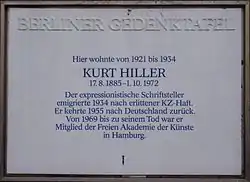Kurt Hiller
Kurt Hiller (17 August 1885, Berlin – 1 October 1972, Hamburg) was a Jewish[1] German essayist of high stylistic originality and a political (namely pacifist) journalist from a Jewish family. An openly gay communist[2] he was deeply influenced by Immanuel Kant and Arthur Schopenhauer, despising the philosophy of G. W. F. Hegel, which made him quite unpopular with Marxists. Hiller was also an influential writer in the early German gay rights movement in the first two decades of the 20th century. In 1929, Hiller took over as chairman of the Scientific Humanitarian Committee from fellow gay activist Magnus Hirschfeld.


Hiller is remembered, too, for his book §175: Schmach des Jahrhunderts (Paragraph 175: Outrage of the Century) published in 1922. Hiller maintained that if homosexuals wanted change, they would have to effect it themselves.
Hiller was arrested by the Gestapo in 1933 following the Nazi seizure of power and was severely beaten before his release in August 1933.[3] He spent nine months in prisons and in the earliest concentration camps, being transferred to Columbia-Hauss, Brandenburg and Oranienburg concentration camp.[4]
Hiller fled, fleeing to Prague later in 1934, and then to London in 1938. In 1955, he returned to Germany, where he lived and wrote in Hamburg until his death.[5] As a renowned and prominent gay activist from the beginning of the century to his death he was connected with many other activists of the German LGBT-movement such as Magnus Hirschfeld, Eva Siewert and many more.
References
- Jewish Aspects in Avant-Garde: Between Rebellion and Revelation edited by Mark H. Gelber, Sami Sjöberg
- Gay Berlin: Birthplace of a Modern Identity by Robert Beachy
- "Kurt Hiller, Victim of Nazi 'gestapo', in Serious Condition, Paper Reveals". www.jta.org. Jewish Telegraphic Agency. 1933-10-16. Retrieved 1 July 2018.
- Before Auschwitz By Kim Wünschmann, p.114
- Ritchie, J.M. (April 1998). "Kurt Hiller - A 'Stankerer' in Exile 1934-1955". German Life and Letters. 51 (2): 266–286. doi:10.1111/1468-0483.00098. ISSN 0016-8777.